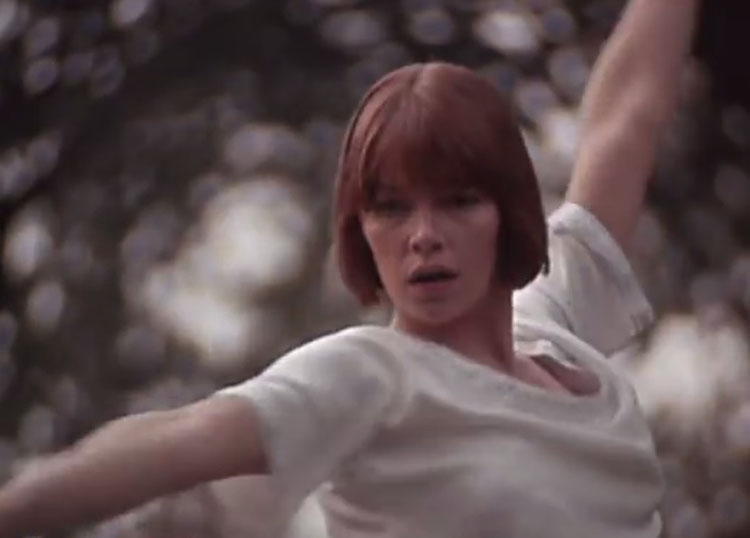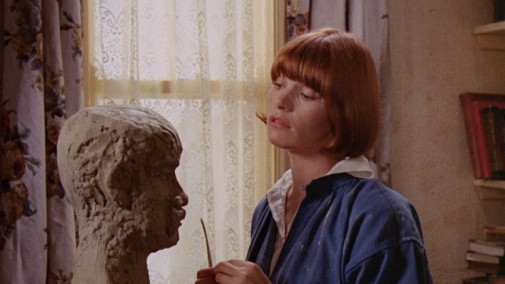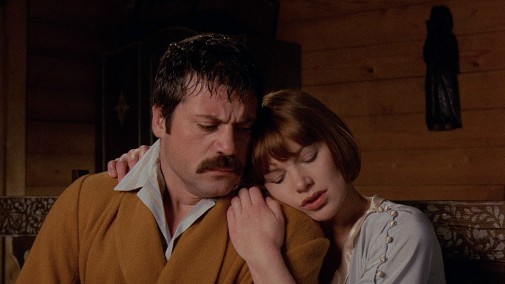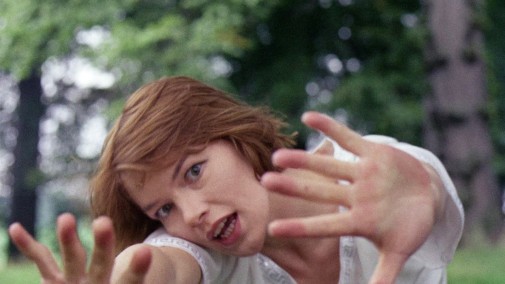All hail the great Glenda Jackson!
 Wednesday, March 25, 2020 at 7:00PM
Wednesday, March 25, 2020 at 7:00PM 
50 years ago, Ken Russell's Women in Love was released in US theaters after having already opened in the UK the year before. Accusations of obscenity and licentiousness followed the picture across the Atlantic and, as it usually happens, polemic was a good catalyst for popularity. Nowadays, such arthouse offerings rarely get mainstream attention but the America of 1970 was a different place as far as moviegoing was concerned. In a time of radical change in society and tastes, Women in Love's tale of bohemian affairs, sexual candor and class hierarchies in 20s England was warmly received by critics and audiences alike. The performance of Glenda Jackson was of particular fame and catapulted the actress to the pantheon of celebrity.
So much so that, by April of 1971, she won the Oscar for Best Actress. To this day, it's one of the weirdest victories in the category's history…

The win wasn't a surprise, however. Women in Love got a lot of attention from the press and Jackson had already cultivated a reputation for herself thanks to obscure masterpieces like Marat/Sade. Moreover, during the period of voting, she was starring in Elizabeth R on British TV, dazzling everyone with the greatest screen portrayal ever made of The Virgin Queen. That surge in mainstream recognizability, great acclaim and the provocative appeal of the film were the ingredients of the victory. Still, Glenda Jackson's first win will never be anything but odd considering the nature of the role and the bizarre qualities of her performance.
In this adaptation of D.H. Lawrence's novel, Jackson plays Gudrun Brangwen, a sculptor whose beloved sister, Ursula, is a schoolteacher. Throughout the film, both start affairs with a pair of upper-class friends, testing the boundaries of commitment and romance, sexual dominance and the roles which gender and class have condemned them to play. The men are Rupert Birkin, a libertine proto-hippie of post-World War I Europe, and Gerald Crich, the son of a mine owning family whose insecurities quickly turn into self-hatred. Theirs is a world of fractured relationships, repressed emotions and a sort of bohemian joie de vivre that's as hollow as it is self-conscious.
Within the realm of these beautiful people, sincerity is hard to come by, although there's plentiful social artifice to be appreciated as well as a good dose of fatalism. Of the quartet of protagonists, Gudrun is by far the strongest individual and the one whose motivations are harder to decipher. From the minute she appears, her face is a mask of severe lines, more capable of morphing into a sneer than drawing a smile. When talking to her sister, Gudrun's words are a beautiful wall of obfuscation, rich in metaphor and poetics. She sculpts those same words into daggers when her interlocutor is the opposite gender, especially when it's Gerald.

Gudrun Brangwen is not an easy person to understand, neither is she a likable heroine.
That said, there's something magnetic about her presence, an ineffable something that arrests our eyes and makes it impossible to look away. Most Oscar-winning performances make a spectacle out of their characters' interiority, telegraphing their inner world for the viewer to see. Jackson takes a very different route, more akin to Isabelle Huppert's minimalism than the robust feeling of someone like Jane Fonda - the following year's Best Actress winner. Hers isn't a performance that translates the mysteries of human psychology. On the contrary, she transmogrifies desire and makes passion into dangerous amorphy.
Still, characterizing Jackson's work as in any way minimalistic seems wrong. Like all Ken Russell productions, Women in Love is guided by an ethos of excess which manifests in every one of its elements, from the expressive cutting to the flowery gurgles of the score. There's savagery in this performance, a hostility and a sort of sadism to the way Gudrun's romantic foibles are played. It's almost as if Jackson is growling at the camera, defying anyone to come close. Her smiles are penciled in with poison and her sensuality is that of a great work of Art, distant and arresting in the same gesture. Gudrun is thus a purposeful cipher, one that feels genuinely dangerous.

That sense of danger is what seduces us and is, in part, what won her the Oscar. When she's dancing to an audience of nervous cattle, we fear for her wellbeing if attacked by the creatures but we also feel uncertain that she won't just consume the animals in an explosion of primordial voraciousness. As the scene turns from pastoral to horror, from avant-garde hypnotisms to farce, Jackson keeps moving in an ethereal choreography only she seems to know. Russell's film is an assault on the senses, an orgy of cinematic style in a wild state, but even the director seems to be at the mercy of his leading lady. The film molds itself around her force. They're unstoppable, both Gudrun and Glenda.
It's crazy to imagine such a peculiar bit of acting won an Academy Award, but it did and we must celebrate.



Reader Comments (33)
A singular fantastic actress.
I love her and love this movie. Thanks for the piece!
I adore Glenda Jackson and one of the happiest occurrences of recent times has been her return to acting but I'm not a big fan of this film.
I'm glad she has an Oscar, even two, I just wouldn't have handed them to her for the films she won them for. The main thrust of this story is really the relationship between Alan Bates and Oliver Reed's characters and Glenda's is a supporting role. Had she been nominated there I might have thought her winning was right but in lead it's not.
Once our current situation has passed I'd love to see some wise film or TV producer offer her an extraordinary showcase role like she's been playing on stage.
joel6 -- I consider her a lead so I have no issue with her victory. I'd go so far as to say all the four main actors of Women in Love are leads. Also, the 1970 Best Actress race wasn't particularly competitive as far as buzzed-about films were concerned. If not Jackson, I'd have given it to Snodgress but Miles and McGraw's movies were more generally beloved. I'd much rather live in a world where Women in Love won the Best Actress Oscar than one in which that statuette belongs to Love Story or the insufferable Ryan's Daughter.
That said, I do wish she hadn't won for 1973's A Touch of Class. It's a rather sour victory for one of her most uninteresting performances. I'd have preferred to see her win a Best Supporting trophy for either Marat/Sade or Mary, Queen of Scots, even though she campaigned as a leading actress for that one.
Thanks for the feedback.
That victory has always felt weird to me because she's not in much of the movie, as far as I can remember.
Very interesting piece. I don't get the Jane Fonda comment.
Peggy Sue -- I used her as an example because she won the year after Jackson and her performance couldn't be more different. Women in Love is all about exaggerated artifice and characters whose psychology is a deliberate mystery. Klute, on the other hand, is a complicated character study whose brilliance comes from the way it opens us a window into Bree's soul. While Fonda's work is genius and complicated, it's easier to understand why the Academy rewarded her than it is with Jackson, hence the aforementioned weirdness of her triumph.
By the way, I consider Jane Fonda's performance in Klute as one of the best honored by the Best Actress Oscar (she's in my top 10), so be assured that I'm not throwing shade or anything of the sort. It's just a couple of successive winners that contrast drastically and, to me, seemed like a good example to show how truly bizarre Jackson's Women in Love performance is in the context of this category's many winners.
Thank you for the feedback and I apologize if my writing wasn't clear and generated some unintentional confusion. Sorry.
Claudio-Since none of the women I would have preferred to see nominated that year (for the record that would be Julie Christie in The Go-Between, Liza Minnelli in Tell Me You Love Me, Junie Moon, Eva Marie Saint in Loving and Stella Stevens in The Ballad of Cable Hogue) actually received a nod I'm happy enough with her win. The only alternate out of the actual line up that I would have been passably okay with is Carrie Snodgrass who was very good in the loathsome Diary of a Mad Housewife but in an open field Stella Stevens would have been my pick.
I liked Glenda in A Touch of Class but the Oscar win is rather unbelievable. I would have rather seen her second prize be for either of the two you mentioned The Maids, Sunday Bloody Sunday or most particularly her atypical but wonderful performance in Return of the Soldier which is loaded with award level work not just from her but Julie Christie, Alan Bates and Ann-Margret.
joel6 -- I've never watched The Ballad of Cable Hogue, so thanks for the recommendation. It's going on my watchlist.
"Women in Love" and "Sunday Bloody Sunday" are both must watch classics
I found you exceptionally clear Cláudio on the Fonda thing, maybe Peggy Sue could have done a quick reread of the part that confused her. Another stellar piece, although with all the lockdowns there will be no excuse for Nathaniel not to produce pieces to your standard, and it’s the one thing to be excited about in this dark time.
"they're nice to have but they don't make you better"
https://www.youtube.com/watch?v=5u2sGdOp9Iw
Jim -- Thank you for the compliments to my writing. I dearly appreciate them and they do help motivate me a great deal. I'm forever thankful.
That said, I'd like to be clear that I don't think Nathaniel's pieces are in any way subpar or that he should strive to achieve "my standard" (whatever that means). While not wanting to be rude, I have to say that sounds vaguely ridiculous to me. He's been doing amazing work for years and if I have a chance to write at TFE, it's because he gives me the opportunity as well as great feedback. He created this site and has made it one of the best places on the internet for Oscar obsessives like me.
Considering that Nathaniel's writing and The Film Experience have been such important parts for my growth as a cinephile (I started reading this blog back in 2006), it makes me feel bad every time I read a comment like this - it's not just you and I apologize for singling you out, Jim (guess you just caught me in a bad mood, which is not your fault).
I might indeed be overreacting (wouldn't be the first time), but I thought I should say something. Hope this doesn't make people reluctant to comment on my pieces. As always, I love to read all your comments and am very grateful for them.
Love that period when Glenda Jackson was doing Mary Queen of Scots, Sunday Bloody Sunday, The Maids and Women in Love. Her very malleable face lends itself to a variety of abstract emotions that are as transitory as they are lasting. I thought she was amazing in Sunday Bloody Sunday.
I saw her onstage when she, Laurie Metcalf and Alison Pill played A, B and C in Albee's "Three Tall Women" at the Golden Theatre. That immediate chill she can bring to an audience on a specific line reading is one of the delicious thrills of seeing someone supreme interacting with the audience in molecular ways.
Cláudio - you are an amazing writer and you (and Nat) are one of the few people I trust when it comes to taste in movies. That said, I love Glenda Jackson. If there’s any actress who can portray Jasmine French, other than Cate Blanchett, it would be Glenda in her younger years. There’s something about their voice that’s very suited for high drama and theatricality in cinema. But I haven’t seen Women in Love, not for a lack of trying, but I just couldn’t find it in any of the streaming services. How were you guys able to watch it? I’m based in the US. Thanks.
Becausewhynot -- Thank you for the lovely words, you're very kind. I also think Jackson and Blanchett have some similar qualities, especially in terms of their voices. Curiously, they've both played the same roles numerous times. There's the obvious case of Elizabeth I, but also Hamlet's Ophelia, Hedda Gabler, Electra (sort of). Also, they both participated in versions of Jean Genet's The Maids. Jackson played Solange onscreen and Blanchett gave life to Claire onstage.
Regarding your question, I'm afraid I don't know where you can stream "Women in Love". I have the BFI Blu-Ray I purchased from Amazon UK some time ago, so I didn't need to stream it in order to rewatch it and write this piece. However, there's a Criterion edition of the film in the US, so one of these days it might pop up on The Criterion Channel. Sorry I couldn't be of more help.
I don't find Glenda Jackson's win all that weird. If you examine the trends in AMPAS voting, the award seems rather predictable.
Beginning in 1964, AMPAS showed a noticeably strong preference for British stories and players. My Fair Lady, set in England, won 8 Oscars including Best Picture, while Becket the historical drama of the turbulent relationship between Henry II and Thomas Becket received 12 nominations, and Surrey-born ingenue Julie Andrews won Best Actress as a proper British nanny.
In 1965, the Oscar race was all about the competition for Best Actress between the two English Julies, Julie Christie and Julie Andrews. Of course, Christie won for Darling.
In 1966, Oscar awarded six prizes including Best Picture to A Man for All Seasons, the story of Henry VIII and his moral battle with Sir Thomas Moore over the king's decision to divorce. The Best Actress race featured sisters Lynn and Vanessa Redgrave, daughters of English actors Sir Michael Redgrave and Rachel Kempson..
In 1968, the Best Picture winner was the musical adaptation of Charles Dickens's novel, Oliver! Also in the running was The Lion in Winter, a historical drama of a Christmas with Henry II and his wife Eleanor of Aquitaine. Katharine Hepburn won her third Oscar for the film in a tie with Barbra Streisand. Also nominated for Best Picture was Franco Zeffirelli's magnificent version of Shakespeare's Romeo and Juliet.
In 1969, the leader in the Oscar race with ten nominations was Anne of the Thousand Days, a historical drama of Henry VIII and his ill-fated second wife Anne Boleyn. Best Actress went to Dame Maggie Smith for The Prime of Miss Jean Brodie.
So when Women in Love became the darling of the cultural elite in 1970, it was no surprise that Glenda Jackson, who until quite recently had been a featured performer in the Royal Shakespeare Company in London, won the Best Actress title. It was merely another accolade for stories and players from across the Atlantic.
Does anyone know where I can find this online? I wish Criterion would release it to its streaming channel - ugh!
One word: Timing.
Elizabeth R was released during the voting period, n no shades to Queen Cate, Queen Dowager Glenda's Queen Liz I set the hard std n is still referred as the yardstick o portrayal of Liz I!
Of cos, she was oso greatly acclaimed n admired by critcs stateside, winning the prestigious NYFCC for Women in Love. So her win is actually not tt much a surprise. I'm juz surprise tt hers is the performance fr the film tt get any award tractions, when the four leads n a deliciously tarty Eleanor Bron r overlooked.
Her 2nd win is more head scratching, guess she almost become the K Hepburn o the 70s, n the Academy clearly luv her in the early 70s
It’s honestly shocking that a Ken Russell film received any kind of Academy recognition. He was also nominated for Best Director for Women in Love.
It’s such a peculiar performance from Jackson, but happy she won. The 70s were such a great time for movies.
Speaking of Jane Fonda, there is NO WAY a distributor like Warner Bros would release a film like Klute now - a dark, weird, sombre, internal character study starring a female lead. We are in a way less adventurous today.
Joel6 - Glenda received her dynamite comeback role late last year in the excellent Elizabeth Is Missing on the BBC - a woman with dementia investigates the mysterious disappearance of her best friend. Like Memento with a 70/80-something female lead. Is it streaming in the US anywhere? She’s as locked as anyone can be for a BAFTA TV nomination (which she’s never won before)
Thank you for clarifying! I also think that Klute is one of the greatest best actress wins.
Ken Russell's masterpiece- a movie that is both erotic and thought provoking.
For those inquiring, in the US this airs occasionally on TCM. If you live in a city with a good library, you also may want to check for the DVD there.
Claudio -- i loved this piece too. well done. And dont feel bad about comments like that. The comments sections have lately become very combative and lots of people are working aggression and hostility and sadness issues out in ways that I'm sure we're only half privvy to (if that). Regardless I consider it a huge badge of honor to have talented writers writing here and i take it as a compliment when people praise you even if they think it hurts my feelings. IT DOESN'T. It just means I did a great job in hiring you :) Whenever I read a great piece by a TFE contributor I find it inspiring and it reminds me to let the inspiration in whenever i can and just keep plugging away in the times when it doesnt since the blog must go on ;)
aaron -- i feel the same about this one and KLUTE. I wonder what it would take for american cinema to ever get that adventurous again.
claran -- that second win is indeed mysterious. I wonder if Streisand could have won that had she lost for A Funny Girl?
Women in Love is such a great film and Glenda is great in it! I really appreciate both of her Oscar wins for how weirdly atypical they feel.
Glenda Jackson really should have won the next year for Sunday, Bloody Sunday. Sarah Miles should have won for Ryan's Daughter in 1970. Fonda should have already won for They Shoot Horses, Don't They? in 1969. I like her a lot in Klute, but Jackson is my clear winner that year.
Want to Buy Step Down Transformer or Are you Curious about What is Step Down Transformer ? Read the blog to get your queries resolved before making a purchase
I adore and respect the heck out of Glenda Jackson. The “Touch Of Class” win was more puzzling, but I think it might have been a vindication for loving and choosing her. “Look! She’s great at comedy too! She’s an all round artistic success!”
Her artistic “take no garbage” stance was also treasured by women working in film and theatre. Glenda always considered her opinion as worthwhile as male geniuses, and didn’t allow herself to be bullied or diminished. Everyone wanted to be like her.
@joel6: yes! I love “Return of the Soldier”! That scene where Alan Bates sees Glenda for the first time in years, always makes me hold my breath and then cry.
My friend and I have affectionate names we call our favorite actresses - Jackson is "Glenda R", named after her ferocious Emmy-winning performance as Elizabeth I in "Elizabeth R". She is the Queen. :)
My favourite performance of hers is that video of her dragging Margaret Thatcher to filth.
@Nat - for 1973 best actress, I was more inclined towards Joanne Woodward who won the NYFCC & the Bafta (althot a yr later), and the runner-up; Marsha Mason in Cinderella Liberty (who is actually more a supp actress to James Caan, who IS the main protagonist)
Marsha Mason & Tatum O'Nea shld've swopped w ea other! & Valentina Corteste shld've nom for Day for Night in the correct year it won Foreign Pic; & win!!